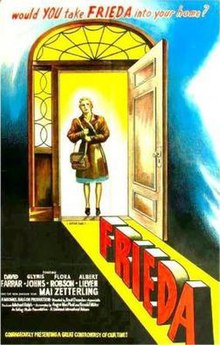Frieda (film)
| Frieda | |
|---|---|

Theatrical release poster
|
|
| Directed by | Basil Dearden |
| Produced by | Michael Balcon |
| Screenplay by | Angus MacPhail and Ronald Millar |
| Starring |
David Farrar Glynis Johns Flora Robson Albert Lieven Mai Zetterling |
| Music by | John Greenwood |
| Cinematography | Gordon Dines |
| Edited by | Leslie Norman |
|
Release date
|
19 June 1947 (UK) |
|
Running time
|
98 min |
| Country | United Kingdom |
| Language | English |
Frieda is a 1947 British film, directed by Basil Dearden, screenplay by Angus MacPhail and Ronald Millar and was produced by Michael Balcon.
Frieda (Mai Zetterling) is a German woman who helps English airman Robert (David Farrar) to escape from a German prisoner-of-war camp as the Second World War nears its end. She loves him; he is only grateful to her. In a church between the Russian-German lines however, Robert marries her, so that she may obtain a British passport. Together they eventually arrive in his Oxfordshire home. Frieda meets his family—his mother, his small stepbrother Tony, Judy (Glynis Johns), the attractive widow of Robert's brother, and Aunt Eleanor (Flora Robson), a figure in local politics and vehemently anti-German.
At first the townspeople are bitterly hostile to Frieda and Robert is forced to give up his job as a schoolteacher. Gradually however, the ill will retreats, and she is accepted—though not by Eleanor. She is befriended by Judy, who, unknown to Robert, is now in love with him. As Robert settles into a new life, working with Frieda on a farm, he begins to lose his prisoner-of-war heaviness. He sees Frieda in a new light. But then they see a film dealing with the horror of Bergen-Belsen and Frieda fears their marriage will not survive its revelation of her countrymen's cruelty. But Robert clings on to what they have established between them.
Suddenly an ex-German soldier appears—Frieda's brother Richard (Albert Lieven). Thinking he had been killed Frieda is initially overjoyed. He had been captured and allowed to volunteer for the Polish Army. Soon she realizes however that he has remained a Nazi at heart. His wedding present to Frieda—a swastika on a chain. In a pub he is denounced as one of the guards at a concentration camp. To Robert, in private, he admits the truth of this accusation, and even claims that Frieda had known and approved of his actions. They fight, and Robert revolts now against everything German as vile and polluted.
...
Wikipedia
